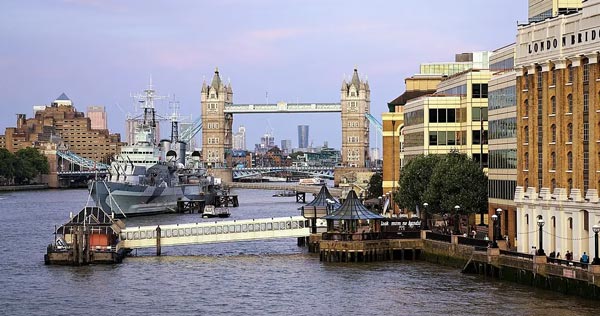When discussing the global financial industry, two classic locations are almost universally mentioned: Wall Street in the United States and the City of London. As crucial hubs of financial history spanning centuries, while London's status may seem somewhat diminished compared to New York, a lean camel is still a bigger horse. The recent news that London has fallen out of the top 20 global IPO markets has raised questions about the sudden decline of this world-renowned financial city.

I. London Falls Out of the Top 20 Global IPO Markets?
According to Sina Finance, with the end of the third quarter, London has fallen out of the top 20 global IPO markets, overtaken by Mexico and Singapore, dealing a fresh blow to its status as a global financial center.
A ranking of the world's busiest IPO destinations shows London dropping three spots to 23rd, behind the frontier market of Oman. Fundraising this year fell 69% to $248 million, the weakest level in more than 35 years.
London's largest IPO this year was the £98 million ($132 million) raised by accounting firm MHA Plc in April. None of the IPOs involved major Wall Street banks; instead, underwriting was handled by smaller local firms like Cavendish Plc and Singer Capital Markets. Data compiled by Bloomberg also shows that the situation was even more dire in the third quarter, with fundraising reaching just $42 million, an 85% year-on-year drop.
London's centuries-old role as an international financial center is being eroded by European competitors and upstarts from Asia and the Middle East. Low valuations are driving companies to private equity buyers or the more deeply capitalized New York market, significantly diminishing its importance compared to when it was routinely one of the world's largest IPO markets.

II. How did the world's financial city lose its luster?
The City of London, once a towering figure in the global financial market, has now fallen out of the world's top 20. How did this happen? How did the world's financial city suddenly lose its luster?
1. The City of London's long-standing prominence in the financial world stems from its historical heritage and the dual strength of imperial expansion. Since the Age of Exploration, Britain, leveraging its powerful navy and global network of colonies, has gradually established an "empire on which the sun never sets" spanning Asia, Africa, and Latin America.
Throughout this process, London, as the political, economic, and financial hub of the British Empire, naturally became a central node for global capital flows. From the issuance of East India Company shares to the financing boom for global railway construction to the clearinghouse for global commodity trade in the early 20th century, London has always played a vital role at the heart of the international financial system. Its comprehensive legal system, sophisticated banking network, free capital flows, and the status of the British pound as the world's leading reserve currency have all contributed to London's dominant position in the global financial landscape.
Especially under the gold standard, London was not only a source of capital outflow but also a global interest rate pricing center. This financial hegemony, underpinned by a colonial economic system, made London the preferred destination for global IPOs, bond issuance, and cross-border investment for over two centuries. It can be said that the City of London's prosperity was no accident, but rather a historical product of the coordinated evolution of Britain's Industrial Revolution, colonial expansion, and financial innovation.

2. Since World War II, Britain's continued decline in national strength has directly led to a systematic decline in its financial market position. The United States, leveraging its leadership in post-war reconstruction and the hegemony of the US dollar, has completely replaced Britain's financial dominance.
After the end of World War II, Britain was severely weakened, its colonial system rapidly disintegrated, its economic focus shifted from manufacturing to services, and its fiscal system long relied on borrowing. Meanwhile, the United States, leveraging its vast industrial capacity, ample gold reserves, and the establishment of the Bretton Woods system, established the US dollar as the sole global anchor currency. As the core of the US capital market, New York, leveraging Wall Street's powerful investment banking system, a vibrant venture capital ecosystem, and a deep capital market, quickly attracted the world's most premium listing resources.
In contrast, while London still retains its reputation as an international financial center, its market depth, liquidity, and attractiveness to emerging industries have significantly diminished. This is particularly true in the IPO sector, where the London Stock Exchange has long favored traditional industries such as energy, mining, and finance, lacking sufficient valuation inclusion and investor base for technology-based and growth-oriented companies. While Nasdaq has become a major competitive venue for global technology companies, London has failed to foster a similarly innovative financing platform, leading a large number of high-growth companies to turn to the US for listings. This signals that London is beginning to lose its strategic initiative in the global competition for capital.
3. The 21st century, and particularly the implementation of the UK's Brexit decision, has exacerbated the City of London's predicament. Brexit not only means the UK loses access to the EU single market but also leads to increased uncertainty about the future regulatory environment. Many financial institutions are therefore reassessing their business layouts in continental Europe, with some even considering relocating to other European cities or directly turning to Asia, North America, and other regions seeking more stable business environments.
At the same time, the rapid development of emerging economies has attracted a large number of companies seeking growth opportunities to list and raise funds locally or to the US stock market for higher valuations and liquidity. These trends have further weakened London's appeal as a preferred IPO location, causing its share of the global capital market to decline year by year.

4. In the long run, the rise and fall of any industry is inextricably linked to the strength of a nation's overall national strength. The decline of the City of London is merely a microcosm of the overall decline of the British economy. The essence of the financial services industry is to provide capital allocation and risk management services to the real economy. Its international competitiveness ultimately depends on the economic vitality, innovation capabilities, and global influence of its home country. As the UK's manufacturing competitiveness continues to decline, investment in scientific and technological innovation is insufficient, and its higher education and talent attraction are relatively weakened, its financial system loses its solid industrial support.
More profoundly, the shift in global financial power is evolving from "Western-centrism" to "multipolarity." While the US dollar and US Treasury bonds remain dominant, the internationalization of the RMB and the rise of regional financial cooperation mechanisms are reshaping the global capital flow landscape.
Historical experience shows that the rise and fall of financial centers is not a linear process, but each transition is accompanied by a reshuffle of national power. London's decline reminds us that true financial influence is never maintained by historical halo, but is brought about by sustained economic vitality and an open institutional environment. Any conservative and backward country, no matter how glorious its ancestors were, will inevitably be eliminated by the market.

%20--%3e%3c!DOCTYPE%20svg%20PUBLIC%20'-//W3C//DTD%20SVG%201.1//EN'%20'http://www.w3.org/Graphics/SVG/1.1/DTD/svg11.dtd'%3e%3csvg%20version='1.1'%20id='图层_1'%20xmlns='http://www.w3.org/2000/svg'%20xmlns:xlink='http://www.w3.org/1999/xlink'%20x='0px'%20y='0px'%20width='256px'%20height='256px'%20viewBox='0%200%20256%20256'%20enable-background='new%200%200%20256%20256'%20xml:space='preserve'%3e%3cpath%20fill='%23FFFFFF'%20d='M194.597,24.009h35.292l-77.094,88.082l90.697,119.881h-71.021l-55.607-72.668L53.229,232.01H17.92%20l82.469-94.227L13.349,24.009h72.813l50.286,66.45l58.148-66.469V24.009z%20M182.217,210.889h19.566L75.538,44.014H54.583%20L182.217,210.889z'/%3e%3c/svg%3e)




